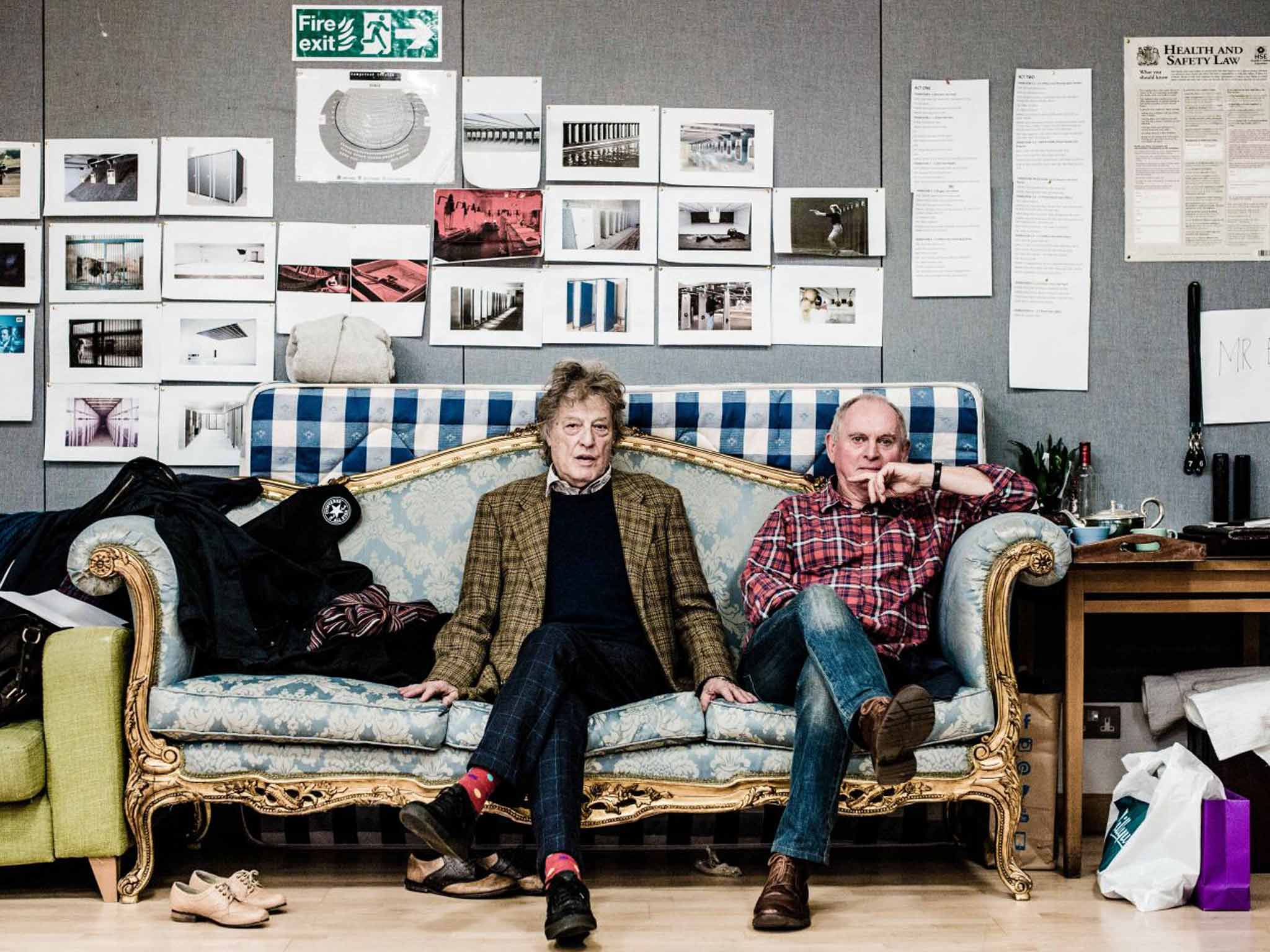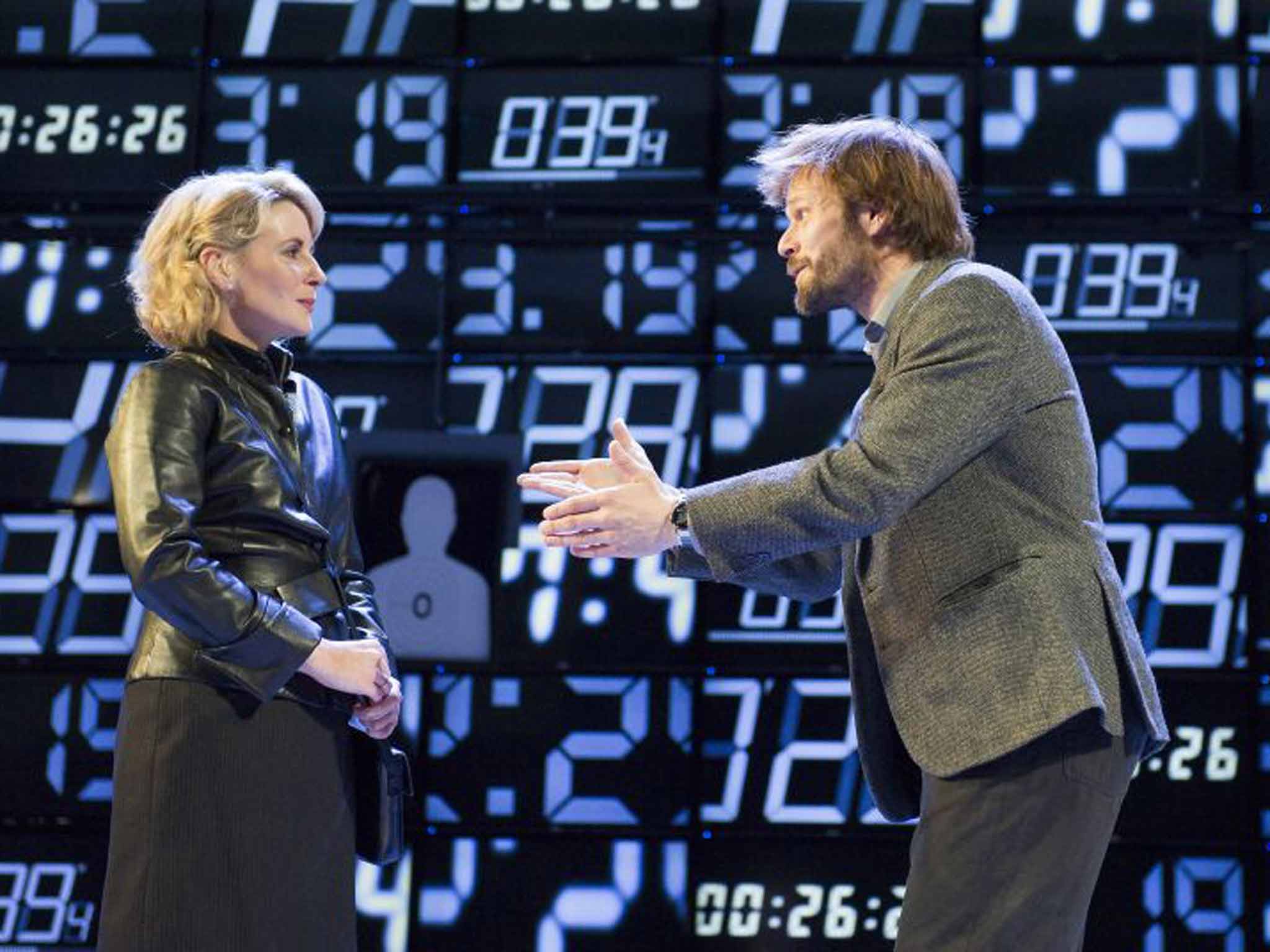Tom Stoppard on ‘Hapgood’: 'I envy those seeing my play'
When Tom Stoppard's spy thriller 'Hapgood' premiered in 1988, it was called 'incomprehensible'. Even the opening stage direction is three pages long. But the audience is still in for a treat, he tells Alice Jones.

“Hapgood is my plot play,” says Tom Stoppard, placing a distinct, disdainful emphasis on the word “plot.” Is that a good thing or a bad thing? “Well,” says the playwright. “It's nice to have done one.”
In fact, Hapgood is the black sheep of the dazzling, and dazzlingly received, oeuvre of the 78-year-old knight and member of the Order of Merit, also known as Britain's greatest living playwright. When the spy thriller premiered in 1988, with Felicity Kendal as the MI5 chief, reviews ran from “enjoyable and tedious” to “thoroughly incomprehensible”.
It was more warmly received on Broadway but, compared with Rosencrantz and Guildenstern Are Dead, Arcadia or The Real Thing, it is one of the playwright's least loved and performed plays.
Now Hampstead Theatre is reviving it for its first proper London run since the premiere 27 years ago. The whizzy new production is directed by Howard Davies and stars Lisa Dillon as the brilliant spy who plays chess without a board for fun. “It wasn't a play I'd ever read, and I hadn't seen it but I liked it a lot,” says Davies. “It took me a couple of reads to understand some of it because the plotting is wonderfully complicated. I had to go back and re-read it.”
“You should have read the first version,” says Stoppard, as dry as sandpaper. The Hampstead Hapgood will be his third or fourth rewrite. This time he has taken out “some of the detail” and moved a major plot reveal up a scene. The problem, as quite often, is its complexity. Just as Jumpers combines moral philosophy and marital crisis, and Arcadia mixes love with chaos theory, Hapgood is both a fiendish Cold War thriller, full of twists and feints, and an exploration of particle physics and Heisenberg's uncertainty principle. Classic Stoppard, in other words.
The opening stage direction is three pages long – a dizzying parade of briefcase-swapping, spies, doubles and jargon in a swimming pool changing room. “Yes, that stage direction doesn't actually tell the reader what's really happening. I thought that's probably a mistake and thought about changing it... I didn't,” says Stoppard. “But, yeah, I think it's actually quite helpful to have my phone number if you're directing the play.”
We are sitting in an office at the theatre during a lunch-break from rehearsals. Stoppard, dressed in tweed jacket, contrasting checked trousers and rakish, red spotty socks, his famous mane and cheekbones sticking out at striking angles, has the air of a retired university lecturer. He speaks slowly, carefully, with a beguiling hint of Czech – he was born Tomas Straussler in Zlin in 1937 and fled to the Far East, then India with his family before arriving in England aged nine – and a slight wheeze (he is a famously voracious smoker). He is rather modest and not at all pretentious, though he frequently apologises for being too earnest. “This has all gone a bit Monty Python, hasn't it?” he worries at one point. One suspects he is wearily used to being misunderstood.
On the first day of rehearsals, he came in to brief the cast and crew. “We asked Tom about quantum mechanics and particle physics. He took off and talked for about three-quarters of an hour and we all said 'what?' And then we slowly caught up,” says Davies. “Alec Newman, who is playing Kerner [a physicist and double agent] was baffled by it but he said the only way to make it work was to treat it as if it was poetry...”
As the action zips about from swimming pool to zoo, HQ to school rugby field, it will have a “filmic, MI5 feel”, adds Davies, but it's far from a classic spy caper. Stoppard wanted to write a play about physics and thought espionage was a good vehicle, not the other way round. Indeed, one of his characters gives a speech debunking spy tales. “They all surprise in the same way,” rails Kerner. “Ridley is not very nice: he'll turn out to be all right. Blair will be the traitor: the one you liked. This is how the author says, 'You see! Life is not like books, alas!' They're all like that. I don't mind. I love the language.”
Is Stoppard similarly dismissive of spy stories? “I love them.” Even James Bond? “Yes absolutely, though I don't consider that to be quite the same genre… I may be wrong about Spectre, I haven't seen it yet, but I don't think Bond has got as far as the concept of moral ambiguity.” Or particle physics. “I'm not sure about that. There seem to be lots of explosions. Bond, I think, has entered the phase of the desperate search for new locations.”

Hapgood's revival coincides with a number of hit “science plays” in the West End, including Photograph 51, about discoveries around DNA, the RSC's history of the atomic bomb, Oppenheimer and the maths-themed The Curious Incident of the Dog in the Night-Time. Perhaps audiences aren't completely daft after all. Last year, Stoppard complained that he had had to dumb down his jokes and allusions for the man in the stalls: “It's very rare to connect with an audience except on a level which is lower than you would want to connect them on. You could raise it a notch and you might lose an eighth of them,” he said. Does he never think of making it a bit more approachable – this is entertainment, after all. “I've got a sort of nicely naive attitude towards the whole thing. It never crosses my mind that there's a difficulty. One tries to write the thing one is writing with a kind of envy for the person who's going to encounter it first time. God, that does sound conceited doesn't it?” he says. “I'm trying to explain that when you're writing you have to be in a state of relish. If it becomes an obligation to deal with this part of the story or explain that person's motive, then one wouldn't enjoy writing at all.”
His complaint about audiences was provoked by the reaction to his most recent play, The Hard Problem, which opened last year at the National. It focused on neuroscience, human consciousness and hedge funds and, like Hapgood, had at its centre a highly intelligent female who juggles academic and maternal ties. It was Stoppard's first new play since Rock 'n' Roll in 2006 and it got mixed reviews. Does he read them? “I don't go running around looking for them, but yes. Part of your brain is there to tell you that an opinion just because it's published is not intrinsically different from the opinion that is not published. It's just one person's response to something. And yet, and yet…” he sighs. “There have been occasions where somebody has written something about a play of mine, which strikes me as being perverse. But you accept that as being part of the rich mix… One feels a bit over-esteemed if you get a very good review and under-appreciated if you get a rather bad review.”
Has it put him off writing? “Oh no. For my whole career, I've found negative comments completely persuasive for a short time. Anything nice anybody has ever said about me can be completely erased for half a day by somebody pointing out that everybody else is wrong.”
He would like to write another play but he doesn't have the time. He married for a third time in 2014, to Sabrina Guinness (he has four sons by his two previous wives, Josie Ingle and Miriam Stern). “Admin”, work with the Belarus Free Theatre, film scripts and reading soak up his time. He became a journalist at the Western Daily Press in Bristol aged 17 and still devours the newspapers. “I just feel grateful and rather lucky if I've got any kind of play at all that I want to write. And at this minute I don't. As regards coming back with a play more quickly than I did last time... I don't know that I should have to worry about it, but I do really. I've got an uneasy feeling that if I lock myself in a room I will probably start something. But I'm too busy to lock myself in a room. I used to be able to achieve quite a lot if I had half a day off. If I haven't got three days off, with absolutely nothing else to worry about, then the time will just pass in reading the weeklies…”
I wonder if, having never been afraid to tackle the big subjects, he might feel compelled to address contemporary crises. Could he write a play about Syria, for example? “I spend half my days recently wondering how to deal with what's on your front page, day after day after day. One just goes to bed every night… worried,” he says. “I ask myself what kind of a play could rise to this occasion, could be equal to the state of affairs the world is in? God, this is getting to be rather earnest, I'm sorry. But from the environment to Syria and back, not to mention the NHS and the police, you begin to think that a stage and a company of actors and so on, how can they be adequate to the occasion? But on the other hand, retroactively, the theatre has been adequate about other things. It's also given a lot of innocent pleasure in its distractions and digressions. The theatre can get under the skin of a situation and has done for 100, or 2,000 years...”
In the meantime, Rosencrantz and Guildenstern, Stoppard's first play, turns 50 next year and he is in discussions about a revival. Who would he like to see star? “Ooh, Johnny Depp and Nicole Kidman, I think.” He giggles. “Well, we shall see.”
'Hapgood', Hampstead Theatre, London (020 7722 9301) to 16 January
Join our commenting forum
Join thought-provoking conversations, follow other Independent readers and see their replies
Comments
Bookmark popover
Removed from bookmarks